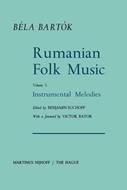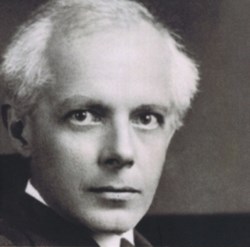Rumanian Folk Music: Instrumental Melodies
n several of his writings on folk music Bela Bart6k recalls an incident I that happened to him in 1904 during a visit to a small village in Tran 1 syl vania. Quite by chance he heard there an eighteen-year-old Hun garian peasant girl singing Hungarian folk songs whose construction was 2 significantly different from the songs he had known until then. This experience appealed to his imagination far deeper than chance oc currences usually do. It sparked in him a creative fire that was there after to impart to his music certain characteristics that are recognizable today as indigenous to the Bart6kian style of composition. The inspirational value of the incident was rekindled by return trips to Transylvania. During these trips he was not merely listening. He began notating, melodies, building them into a coordinated collection. Soon Bart6k's itinerary took him into villages populated in checkered proximity by both Hungarians and Rumanians, thence into little communities where the population was exclusively Rumanian. There he discovered that their songs were much less, if at all, influenced by the urban civilization of Western Europe than those he had collected in Hungarian villages. In an interview he gave to a Transylvanian newspaper in 1922, Bart6k described the difference between the available Hungarian and Rumanian songs.
-
Autore:
-
Curatore:
-
Editore:
-
Collana:Bartok Archives Studies in Musicology
-
Anno:2011
-
Rilegatura:Paperback / softback
Le schede prodotto sono aggiornate in conformità al Regolamento UE 988/2023. Laddove ci fossero taluni dati non disponibili per ragioni indipendenti da Feltrinelli, vi informiamo che stiamo compiendo ogni ragionevole sforzo per inserirli. Vi invitiamo a controllare periodicamente il sito www.lafeltrinelli.it per eventuali novità e aggiornamenti.
Per le vendite di prodotti da terze parti, ciascun venditore si assume la piena e diretta responsabilità per la commercializzazione del prodotto e per la sua conformità al Regolamento UE 988/2023, nonché alle normative nazionali ed europee vigenti.
Per informazioni sulla sicurezza dei prodotti, contattare productsafety@feltrinelli.it




